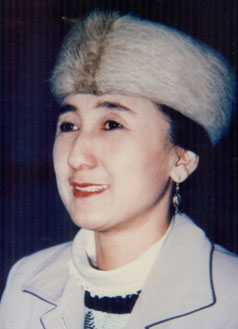|
China Muslim activist: from unknown
to Nobel nominee
By Benjamin Kang Lim
Mon Sep 11, 1:50 AM ET
 BEIJING
(Reuters) - China counted on Rebiya Kadeer, a Muslim
businesswoman-turned-activist, fading into political
irrelevance like most exiled Chinese dissidents when
she left for the United States last year. But it may
have miscalculated. BEIJING
(Reuters) - China counted on Rebiya Kadeer, a Muslim
businesswoman-turned-activist, fading into political
irrelevance like most exiled Chinese dissidents when
she left for the United States last year. But it may
have miscalculated.
Kadeer, 58, an ethnic Uighur jailed for more than five
years in China for providing state secrets to
foreigners before her exile, won a Rafto Prize for
human rights in Norway in 2004 and has been nominated
for the Nobel Peace Prize this year.
"Rebiya Kadeer champions the rights of western China's
Uighur ethnic group and is one of China's most
prominent advocates of women's rights," Annelie
Enochson, a Swedish parliamentarian, wrote in
nominating Kadeer for the prestigious Nobel award.
"Kadeer has also used her resources as founder and
director of a large trading company in northwestern
China to provide fellow Uighurs with training and
employment," Enochson wrote in the nomination, a copy
of which was sent to Reuters by e-mail.
This year's winner is due to be announced in Oslo on
October 13. Kadeer is probably only one of many
nominees as any member of parliament worldwide can put
forward a name.
Four Rafto laureates have gone on to win the Nobel
prize. Only 12 women have won since 1901, upsetting
many feminists.
The director of the Norwegian Nobel Institute, Geir
Lundestad, said in 2001 the committee should "sooner
rather than later" speak out about the lack of
democratic rights in China. He said China was the main
exception to a global move to democracy.
ONE-TIME LAUNDRESS
Tibet's god-king, the Dalai Lama, won the Nobel prize
in 1989, almost 40 years after Chinese troops marched
into his homeland. He fled to India in 1959 after an
abortive uprising against Chinese Communist rule.
Kadeer, a one-time laundress, was little known outside
China before her exile but a win would raise the
profile of militant Uighurs' hitherto faceless
movement to make the restive region of Xinjiang an
independent state called East Turkestan.
"Rebiya has undisputed legitimacy and the capacity of
uniting Uighurs in exile," said Nicholas Bequelin, a
China researcher in Hong Kong for the New York-based
Human Rights Watch.
Kadeer, president of the Uighur American Association,
is tipped to be elected president of the World Uighur
Congress in October, a source close to her said.
Her biography in German, "A Woman's Struggle against
the Dragon," will be published next year.
The Chinese Foreign Ministry had no immediate comment
on the nomination but denounced Kadeer for "frequently
engaging in anti-Chinese splittist activities."
"This kind of person is not qualified to represent
Chinese Uighurs," the ministry spokesman's office said
in a statement.
China keeps a tight grip on oil-rich Xinjiang, which
shares borders with three former Soviet Central Asian
republics, Afghanistan, Pakistan, Russia and Mongolia.
China calls Uighur militants terrorists and blames
them for a string of bombings and assassinations in
the 1990s.
But human rights groups say China has used its support
for the U.S.-led war on terrorism to justify a wider
crackdown on Uighurs, including arbitrary arrests,
closed-door trials and use of the death penalty.
Kadeer was once a member of the top advisory body to
China's parliament but fell from grace and was
arrested in 1999 while on her way to meet U.S.
congressmen visiting Xinjiang.
Her assets were worth 270 million yuan ($33.8 million)
at the time of her arrest but her trading firm and
other businesses in real estate are now almost
bankrupt due to official harassment.
She said two of her sons were beaten up by Chinese
police when they were detained in June and accused of
tax evasion. The whereabouts of a third son who faces
subversion charges are unknown and a daughter has been
put under house arrest.
"Wang Lequan rushed to arrest my sons but Beijing may
not rush to sentence them," Kadeer, a mother of 11,
told Reuters by telephone from her office in
Washington, referring to Xinjiang's Communist Party
chief. She insisted her children were innocent.
Kadeer pledged to champion the rights of Uighur women
and children at any cost, lamenting that many girls
ended up working as prostitutes in Chinese cities and
boys became thieves or pickpockets.
"I'm ready to pay the price," she said. "The more the
Chinese government tries to destroy me, the more
respect and influence I will have from my people."
(Additional reporting by Alister Doyle in Oslo) ...
|



 BEIJING
(Reuters) - China counted on Rebiya Kadeer, a Muslim
businesswoman-turned-activist, fading into political
irrelevance like most exiled Chinese dissidents when
she left for the United States last year. But it may
have miscalculated.
BEIJING
(Reuters) - China counted on Rebiya Kadeer, a Muslim
businesswoman-turned-activist, fading into political
irrelevance like most exiled Chinese dissidents when
she left for the United States last year. But it may
have miscalculated.